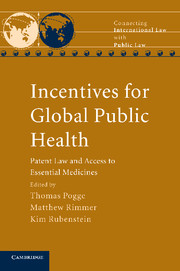Book contents
- Frontmatter
- Contents
- Contributors
- Series Editors' Preface
- Editors' Preface
- Introduction: Access to essential medicines: public health and international law
- Part I International trade
- Part II Innovation
- Part III Intellectual property
- Part IV Healthcare
- 13 Beyond TRIPS: the role of non-state actors and access to essential medicines
- 14 Securing health through rights
- 15 The role of national laws in reconciling constitutional right to health with TRIPS obligations: an examination of the Glivec patent case in India
- 16 Tipping point: Thai compulsory licences redefine essential medicines debate
- Bibliography
- Index
14 - Securing health through rights
Published online by Cambridge University Press: 04 August 2010
- Frontmatter
- Contents
- Contributors
- Series Editors' Preface
- Editors' Preface
- Introduction: Access to essential medicines: public health and international law
- Part I International trade
- Part II Innovation
- Part III Intellectual property
- Part IV Healthcare
- 13 Beyond TRIPS: the role of non-state actors and access to essential medicines
- 14 Securing health through rights
- 15 The role of national laws in reconciling constitutional right to health with TRIPS obligations: an examination of the Glivec patent case in India
- 16 Tipping point: Thai compulsory licences redefine essential medicines debate
- Bibliography
- Index
Summary
Introduction
While ‘rights-talk’ is an important emancipatory discourse of our time, it is a form of discourse that is easier to conceptualize than institutionalize. In the language of rights, fundamental interests in food, shelter, education or housing, whose fulfilment is doubtless central to an emancipated life, become notoriously difficult to secure in appropriately institutional terms. These difficulties are perhaps nowhere more evident than with respect to the right to health. As a material interest so heavily influenced by economic and social determinants, by the availability and constraints of scientific and cultural knowledge, and by background protections of property and contract rights, the right to health presents momentous legal challenges. Its claims raise seemingly endless chains of causation and duties (and obfuscations from the role of genetics and luck) that defy our legal–institutional, as well as moral, categories.
Yet despite all this, the right to health remains a popular discursive strategy for social movements advocating for medicines, healthcare or public health protections. More than just a galvanizer, the right to health may in fact prefigure and produce actual legal–institutional outcomes. Indeed, if we investigate political strategies around the right to health and the use by health rights movements of litigation, legislation and constitutional rights, we may observe a less fixed and certain, but possibly far-reaching, way in which health is secured through rights. This chapter examines two such cases, involving access to affordable medicines in South Africa and access to healthcare in Ghana.
- Type
- Chapter
- Information
- Incentives for Global Public HealthPatent Law and Access to Essential Medicines, pp. 357 - 380Publisher: Cambridge University PressPrint publication year: 2010
- 1
- Cited by



